|
Disclosure: We may earn a commission from links on this page
|
Developer: BioWare | Publisher: Electronic Arts |
| Release Date: March 6, 2012 | Available On: PC, PS3 and Xbox
360 |
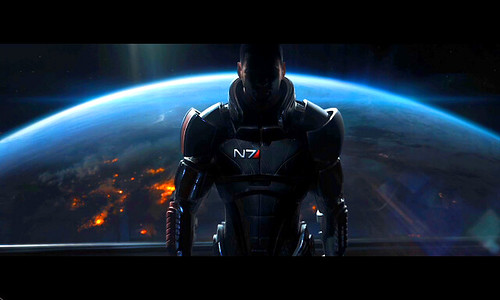
Mass Effect 3 Review Information
Console Played: Xbox 360
Progress: 100%
Difficulty: Normal
Shepard: Renegade Soldier Class, Ruthless, War Hero
A Mass Effect
Since the beginning of the Mass Effect franchise, we’ve seen the series’ title hold true to the decisions that gamers have made throughout, while witnessing the effects of those unique decisions. The choices you make with your Shepard character can be carried over from game to game to produce results ranging from slightly to somewhat catastrophic, affecting the entire galaxy. Where one Shepard can have a healthy relationship with a given race, another one can completely screw that same race over; the results having an impact that ultimately affects your Shepard in many ways.
Not only has the franchise seen a ‘mass effect’ (all pun intended) within its storyline, it has also seen a very similar effect with gamers and non-gamers alike. When Mass Effect came out in 2007, there was a huge controversy with a specific sex scene in the early parts of the game, sending ripples on the Internet for quite a while. In 2010, Mass Effect 2 garnered a small wave of talk that concentrated on a ‘lack’ of homosexuality in the game. With the most recent March release of Mass Effect 3, the Internet has been saturated with rants and raves from gamers and dedicated fans of the series, typicaly related to the ending of the trilogy. Since I first turned my eyes to a controller, I have never seen such a rally of criticism toward any one game or even an entire franchise of this magnitude. This truly makes the name of the franchise appropriate for everything the series has stood for the past five years. Now that the dust has begun to settle, I figure it is the appropriate time to provide my complete review of the game, no spoilers included…
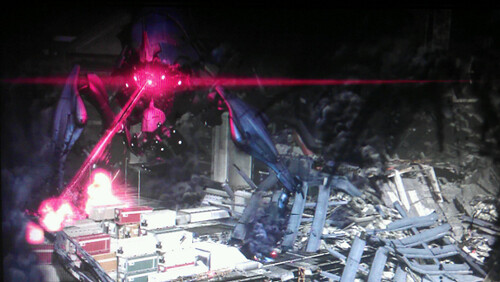
Reaper
Invasion
Desperate Times Call for Desperate
Measures
The first thing you read when you look at the back of the Mass Effect 3 case is the line, “Take Earth Back”. This makes perfect sense, because one thing is true at this point…the Reapers are here! The enormous, sentient alien life form has descended upon the galaxy in large numbers, looking to purge the entire system of life, starting with Earth.
Up to this point in the series, little has been explained about the Reapers. What we do know is not good: they are extremely powerful, highly intelligent, and strongly determined to bring about destruction to the galaxy with an iron fist. In the opening minutes of Mass Effect 3, you witness a sliver of what an army of Reapers is capable of. For the first few hours of the game, I was seriously wondering what it would take to destroy an entire army of them, because they are highly resistant to many forms of conventional damage.
As the Reapers mark their new territory in the Milky Way, it is apparent that the situation is dire, and everyone looks for a hero. One person who might have the answer against the seemingly impregnable Reapers…Commander Shepard, of course.
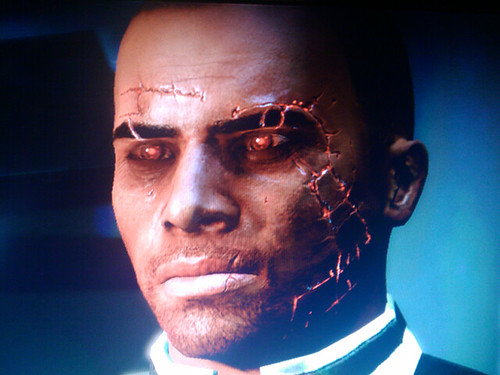
Michael J.
Shepard
A Shepard That Leads
Commander Shepard is the best option the galaxy has at defeating the Reapers. With his/her most updated resume, Commander Shepard has the most knowledge on the Reapers, and has a track record of making tough decisions when they matter most. Whether these decisions ended up being in the best interest of the galaxy or not is entirely in the eyes of the beholder, but one thing can be said…Shepard gets results. Now, reinstated of his/her Spectre status, Shepard must assemble a squad and do the impossible: rally the galaxy together, and find a way to defeat the Reapers.
It sounds simple, but you definitely have your work cut out for you. Rallying the galaxy toward a common cause can be easy or difficult, depending on the decisions you made in the previous games. If you made some poor choices that ended up killing off certain allies, the story is affected. If you decided not to save an entire race from certain extinction, there is an impact. If you decided to just ignore certain missions, or disagreed with specific people on a point of view, this also seems to show up in Mass Effect 3. This is a series where your decisions matter.
Now, there is a grey area of leniency towards this idea where some decisions don’t necessarily carry over, or some choices – whether you choose the upstanding Paragon, or the gut-wrenchingly ‘evil’ Renegade – don’t really matter in the grand scheme of things. You wouldn’t necessarily notice these instances however until you play the game a second time. More on the Paragon/Renegade choices in a bit…
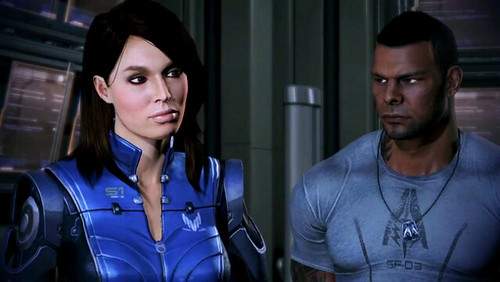
Lt.
Commander Ashley Williams and James
Vega
Forming Relationships : New and Old
Saving the galaxy from almost certain doom is going to require precise calculations, a lot of luck, and a dedicated squad that you know you can trust to help even the odds. Since the beginning, Shepard has amassed a squad of allies from nearly every race in the galaxy, who may or may not be loyal depending on past experiences. How you treat them throughout the series determines their longevity with the crew, how dedicated they are to your cause and whether or not they have the focus to concentrate on the mission at hand. A conversation gone horribly wrong can leave your team minus one quick. A questionably loyal friendly may be detrimental to your squad numbers and overall performance.
In Mass Effect 3, a lot of familiar faces make a return, again based on your actions in the first two games. There are returning allies and cameos, but it’s a shame that some of the latter couldn’t have been persuaded into joining the squad. Still, it was nice to see what those characters have been up to. There are a few new faces that join your cause to save the galaxy, and though they are brought into the game in a way that doesn’t break the series’ consistency, I would not say that they make it any easier for someone with no prior experience to understand what is happening.
What I found and loved about this game and the many interactions with your allies is the overall chemistry. Between completing each mission, I would do my rounds on the Normandy, initiating conversation with all of my allies. Honestly, I was blown away. I would enter Garrus’ quarters and joke about our war scars. There was a moment when I entered Liara’s office and we discussed our previous interests in each other, hasing out whether or not we wanted to make things “official”. I would reminisce with Ashley about when we first met. I would stroll into the crew quarters and overheard a conversation between Garrus and the new recruit – James Vega – about who has the better war stories.
Moments like these truly make the game special, as you start to feel closer to the crew, having shared a lot of time and memories together. Even the newest member of the crew, Vega, is an interesting character who molds himself as part of the Normandy’s crew very nicely. I have to commend the writers at BioWare for doing such a great job of keeping the characters consistent throughout all three games. It made me feel that much more immersed into the storyline, connected to the characters lives as if I was watching a television series.
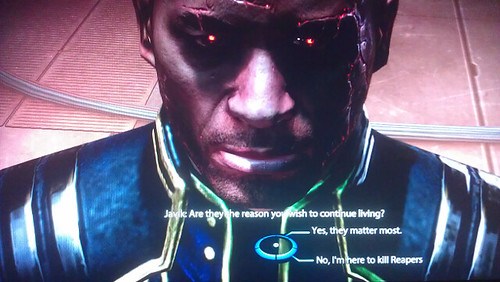
Tough Decisions
Are You A Paragon or Renegade?
As I’ve discussed, players have made a lot of decisions throughout each game in the Mass Effect series – some small, some large, but (for the most part) all of which have had a large effect on your time in the galaxy. The decision-making process has always been classified between the Paragon (Good) or Renegade (Bad) answers. Now, when I say “good” or “bad”, this really depends on how you look at each situation. For the most part, I view the Paragon as the most positive, saving the most lives. The Renegade is blunt, sacrificing the most lives in the interest of the greater good. Again, it’s all about your perspective. In the above image, you can see my Shepard, with red eyes and scars on his face. This is specific for a Renegade-bound Shepard. The more Renegade answers you make, the more it is reflected in your face, and you become more revered to the people of the galaxy. While the facial effect has only shown up in Mass Effect 2 and 3, there has always been a bar that displays how much of a Paragon or Renegade your Shepard is.
Personally, I wanted my Shepard to be regarded as a Renegade, not because being bad is cool (though it really is in this case), but because not every hero is an upstanding citizen. I thought it would be interesting to have a character who is capable of saving the world, but also has a character flaw that the galaxy has to overcome. My Shepard’s past is indicative of this: he gets the job done by any means necessary, and it is realistic to think that some lives would need to be sacrificed to save a majority. When the galaxy is on the line, I would see my kind of Shepard doing what needs to be done sooner than a Paragon Shepard, but that’s just how I feel. This is exactly what makes each Shepard unique: each player can shape his or her character any way they want to.
One thing that I noticed about this game in particular; BioWare seems to have cleaned up the decisions that you are capable of making. In the previous games you were able to choose between a Paragon, Renegade, an additional middle-of-the-road option, and sometimes more. In Mass Effect 3, the decision wheel often leaves you with only the Paragon or Renegade options to choose from.
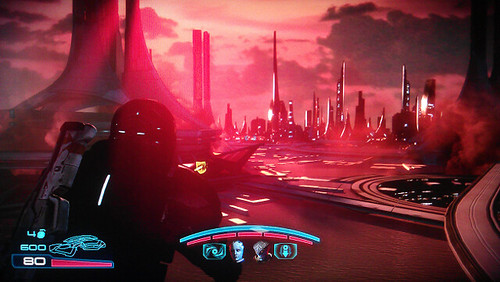
Combat
within lush scenery
Squad Up!
Mass Effect 3’s gameplay is tighter than ever before – similar to Mass Effect 2, with combat that feels very fluid and fast-paced. The cover mechanics are not perfect but have been improved, and you can now run indefinitely without any worry of running out of stamina – I have personally been waiting for this to happen since the first game. Also, there is a dodge feature that allows you to avoid enemy gunfire or close-quarters combat. If close-range combat is unavoidable or you are simply feeling bold, there is a new melee option that dishes out heavy damage to the opposition. Each character class features its own uniue melee attack, and it is pretty nice to see the differences between them.
Moving on, the AI seems to be pretty smart this time around – this goes for both your allies and the enemies. My light-shielded friendlies would tend to hang back, loading up foes with their sub-machine gun ammo while throwing up appropriate powers for the occasion, as my tanks would hide behind cover and slowly push up the enemy ranks, dealing out damage with shotgun rounds and biotic powers. If I wasn’t so attuned to commanding each character and controlling every second of battle, I could still trust that my allies could get the job done on their own…at least on the Normal difficulty setting.
One thing that I noticed; once I had all of my allies at my disposal, at times I still felt like I had an unbalanced squad. There are a total of 6 classes in the game, and without counting Shepard I only had 4 of those classes to choose from. This is no deal-breaker when all is said and done, but it does limit your options a bit when deciding who to choose before a mission. Sometimes, you want a class that can deliver either Vanguard or Sentinel capabilities, and in this case I had neither. One of those classes could have been available based on a certain decision, but the other leaves me pretty much out of luck.
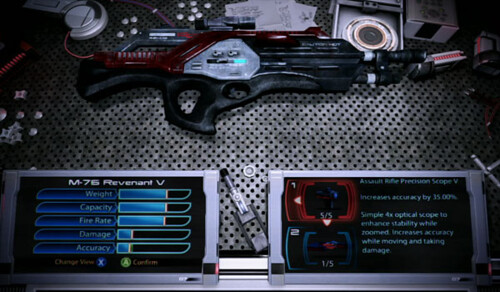
Weapon
Loadouts
Each gun feels different, featuring anything from three-round burst to fully-automatic firing, strong kickback to very little recoil. There are mods that you can buy in stores or find among missions that enhance the various weapons at your disposal; these upgrades can really make a difference for Shepard in the heat of battle. If you need a 4x scope on your sniper rifle to reach those pesky enemies that biotic powers can’t reach, no problem. If you really like the M-76 Revenant because it is powerful and carries a lot of ammo, but aren’t so fond of the recoil, you can get a mod that reduces the kickback considerably. If a weapon you like is too heavy for you to carry with other weapons (weight is an issue in this game), slap on a mod that reduces the weight – problem solved! There are mods that increase your ammo, damage, accuracy, and many more. I do however feel that this feature is a waste when it comes to your allies. I’ve never had to worry about my allies running out of ammo mid-battle, and it seems pointless to add weight reducers or accuracy boosts to them as well. I mainly stuck to just increasing their damage outputs and left it at that.
Leveling up in Mass Effect 3 is pretty similar to ME2; complete a mission, and you get experience for it. During a mission, you will find various bits of information, items, weapons, mods and such that will also give you experience. I do miss the system in ME1, where every kill gave you experience. It feels more justified getting experience for what I kill rather than just receiving an overall lump sum, but I digress. Leveling for the most part is pretty easy. I did just about every single mission (minus a few at the beginning of the game) and finished the game at level 57, with level 60 being the current level cap. For the most part, the same skills that were available for you to learn and upgrade for each class in ME2 are still intact here, with the same point system for leveling them up to boot. If at any point in the game you aren’t satisfied with any of your character’s allocation of skills, there is an option to re-spec, free of charge…at least for the first time. I never used this feature, and it does show a cost amount, but you do get at least one freebie.
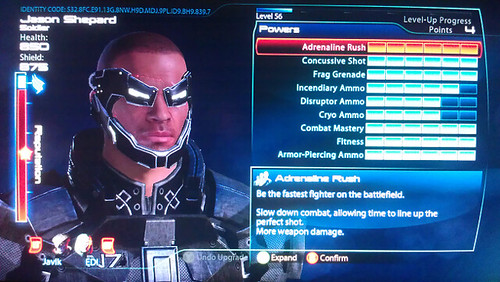
What to
level up next…?
Saving the Galaxy with Friends
My inital thoughts of Mass Effect with
multiplayer had me intrigued. I saw it as an
idea that could be executed well, but one that
would only be tacked on as an extra with no real
substance. When the demo was released, I was
convinced. The multiplayer aspect was and still
is a very fun feature. I found myself pouring
hours of time into it with friends online.
Putting a squad of four together that
compliments each other well enough to go against
the opposition in an 11 wave mode of survival is
very fun. When you start off, it can be a little
rough because you don’t have all of your powers
and they aren’t developed yet, but as you
progress, you really start to see how powerful
you become. The mode feels a lot like the
campaign with some added features, like being
able to revive allies when you’re close to them,
being able to revive yourself with medi-gel in
case you fall. There are also bonuses you can
add to your powers and weapons to make them more
powerful for a single game.
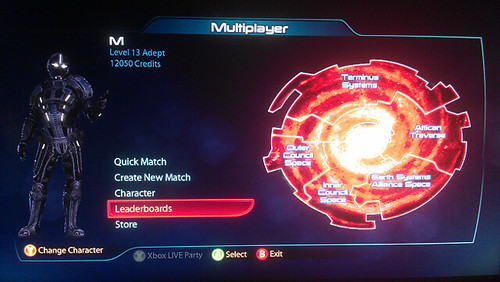
A
bit of multiplayer amongst friends
You can choose from each of the six classes:
Soldier, Engineer, Adept, Vanguard, Infiltrator
and Sentinel. Within each class is a variety of
characters to choose from, each with their own
respective group of powers. Any character you
level up within the class will maintain the
level of the class. So for instance, if you
level up the Krogan Soldier to level 15 and
decide to switch to the Human Soldier, he’ll
also be at level 15 but with possibly different
powers. It isn’t until you reach the max level
of 20 and decide to promote your character that
things change. Once you promote your character,
that character will help Shepard in the fight
against the Reapers in the main game. A very
nice idea on paper, but one that ends up pretty
lackluster, as your hard earned level 20 becomes
nothing more than a mere statistic in the
overall fight, and you must rebuild a soldier in
multiplayer from level 1. What a waste. Another
thing I didn’t like about the multiplayer is how
you acquire your gear and items. You earn
credits through surviving waves and when you’re
done, you must purchase chests that contain
randomly generated items and equipment…what!?
So my hard earned time and credits are going
towards the chance that I may pick up a new
weapon or that medi-gel I need to keep me and my
teammates in the fight? What happened to having
an armory of weapons and items to choose from,
each with a cost and buying what you can afford?
Sounds much more conventional to me, doesn’t it
BioWare? To top it off, BioWare gives you the
option of dropping microsoft points (i.e REAL
MONEY) towards the CHANCE of acquiring the
weapons and gear you want in case you’re too
lazy to grind out the time and earn your points.
I really hope I’m not the only one here who
finds this idea to be ridiculously absurd and
unnecessary.
The End of A Trilogy
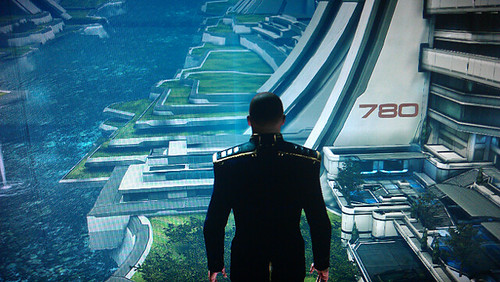
A moment in
silence
Make no mistake, I have no intention of
revealing anything about the game’s ending. I
did witness what was supposed to be the best
ending in the game, watched the credits to the
very end and went back to the title screen
feeling somewhat empty and indifferent. I talked
about it with friends to form some sort of
clarity and closure on things…ideas that the
ending honestly didn’t deliver upon the way I
wanted and I still walked away with questions.
There are plenty of ‘what if’ scenarios that
have come up in discussion but ultimately have
to remain as ‘what ifs’ until there is more
light shed on what it all means. The best
example that I can compare this too would be
seeing the ending of The Sixth Sense on the day
it comes out and walking out of the theaters
with an ending that didn’t explain anything nor
make sense. I have been tossing back and forth
between adding this to the review or leaving it
out, and I decided that it should be added
because anyone who plans on playing this game
has more than likely heard some buzz about the
ending. It’s not a horrible ending, it’s not a
great ending…it’s really not even a good
ending to be perfectly honest. It is just a very
indifferent ending that doesn’t clarify or close
things off the way a story of this magnitude
should have ended. Would I recommend it?
Definitely! Any gamer who loves RPGs owes it to
themselves to experience this series. What I
wouldn’t recommend is jumping into this series
by playing Mass Effect 2 or 3 first. This is NOT
one of those games you can just pick up and
understand what’s going on halfway through. The
lore of this game is so massive that there is no
way you can understand it. I don’t care how many
characters are thrown in to make it ‘easier’ for
gamers to transition easy. *I’ll say this
again!* If you pick up Mass Effect 3 and you
haven’t played 1 or 2, it will do nothing but
cause confusion.You won’t know anything about
the characters and the little things that make
them so great and lovable, and the decisions
that you make in the game won’t carry nearly as
much weight. If you plan on playing these games,
play them from the beginning. You can find both
Mass Effect 1 and 2 for well under $20.
Aside from the ending, there are very little
problems I had with the game overall. Most of
problems I had were held within the multiplayer
with promoting characters and obtaining gear and
items. One thing that I will say, and this is
specific to a Renegade playthrough, is that I
felt as if there weren’t as many options to
perform renegade actions. Plus, many of the
renegade actions I did perform seemed quite a
bit more mellow and watered down than it would
have come off in the previous games. I figured
this would’ve been the game for a Renegade to
truly shine. Don’t get me wrong, you do make
some tough decisions as a Renegade; ones that
make me stop and say, “Damn!” even as I write
this. But, it seemed as if, in the interest of
rallying the galaxy together, BioWare wanted
even Renegades to be somewhat diplomatic in the
fight against the Reapers. In the end, this is
still one of my favorite RPGs of all time, and
though this game falls under the class of
unsatisfying endings that continue to plague our
games today, I still hope BioWare’s plans to
clarify things succeeds…because everything
else about the game does with flying colors.
| Graphics: | 9 |
| Sound: | 8 |
| Gameplay: | 9 |
| Creativity: | 9 |
| Replay Value/Game Length: | 10 |
| Final: | 9 out of 10 |
| Written by Jason M. Lataillade | Write a User Review |